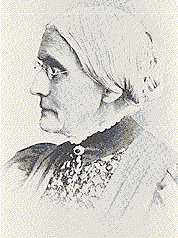
Early Life.
Anthony was born on Feb. 15, 1820, in the village of Adams, Mass., the second of eight children. In 1827 her family moved to Battenville, N. Y., and in 1845 settled permanently in Rochester, N.Y. Encouraged by her father, a onetime schoolteacher, Anthony began teaching school when she was 15 years old and continued until the age of 30.
A liberal Quaker and dedicated radical reformer, Anthony opposed the use of liquor and advocated the immediate end of slavery. From 1848 to 1853 she took part in the temperance movement and from 1856 to 1861 worked for the American Anti-Slavery Society, organizing meetings and frequently giving lectures. In 1863, during the American Civil War, she founded the Women's Loyal League to fight for emancipation of the slaves. After the end of Reconstruction she protested the violence inflicted on blacks and was one of the few to urge full participation of blacks in the woman suffrage movement.
Fight for Women's Rights.
Anthony's work for women's rights began in 1851, when she met Elizabeth Cady Stanton. From 1854 to 1860 the two concentrated on reforming New York State laws discriminating against women. Anthony or ganized women all over the state to campaign for legal reforms. She would often deliver speeches written by Stanton, who was occupied with her young children.
Anthony and Stanton became convinced that women would not gain their rights or be effective in promoting reforms until they had the vote, and nationwide suffrage became their goal after the Civil War. In 1869 they organized the National Woman Suffrage Association to work for a constitutional amendment giving women that right. Although the newly freed slaves were granted the vote by the 15th Amendment, women of all races continued to be excluded. From 1868 to 1870 Anthony and Stanton published a newspaper, Revolution, focused on injustices suffered by women. To dramatize her fight, Anthony defiantly registered and cast a ballot in the 1872 presidential election and, when arrested and convicted, refused to pay the $100 fine. She went to Europe in 1883, met women's rights activists there, and in 1888 helped form the International Council of Women, representing 48 countries. At the age of 80 she resigned as president of the National American Woman Suffrage Association, but she continued to be a regular speaker at its conventions until her death in Rochester, N.Y., on March 13, 1906.
Evaluation.
Anthony always acknowledged Stanton as the founder of the women's rights movement. Her own achievement lay in her inspiration and perseverance in bringing together vast numbers of people of both sexes around the single goal of the vote. On July 2, 1979, the U.S. Mint honored her work by issuing the Susan B. Anthony dollar coin. P.G.H. For further information on this person, see ~Biblio. ANTHONY, Susan Brownell .
Anthony, Susan Brownell. 1820-1906. American reformer, b. Adams, Mass. Active in temperance, abolitionist, and woman suffrage movements (from c.1850); with Elizabeth Cady Stanton organized National Woman Suffrage Association (1869); traveled, campaigned, wrote tirelessly on behalf of suffrage; president, National American Woman Suffrage Association (1892-1900). Author, with Stanton and M.J. Gage, of History of Woman Suffrage (1881-1902).
"Men their rights and nothing more; women their rights and nothing less." --- Susan B. Anthony, The Revolution
Copyright Funk and Wagnalls Encyclopedia